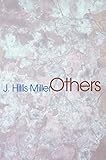Others / Joseph Hillis Miller.
Material type: TextPublisher: Princeton, NJ : Princeton University Press, [2021]Copyright date: ©2002Description: 1 online resource (297 p.)Content type:
TextPublisher: Princeton, NJ : Princeton University Press, [2021]Copyright date: ©2002Description: 1 online resource (297 p.)Content type: - 9780691224053
- Criticism -- Europe -- 20th century
- Difference (Psychology) in literature
- European fiction -- 19th century -- History and criticism
- LITERARY CRITICISM / Semiotics & Theory
- Absurdity
- Allegory
- Allusion
- Analogy
- Anthony Trollope
- Anthropomorphism
- Aphorism
- Aporia
- Appropriation (art)
- Assonance
- Autobiography
- Catachresis
- Charles Dickens
- Concept
- Consciousness
- Criticism
- Determination
- Dichotomy
- Dizziness
- E. M. Forster
- Edmund Husserl
- Emblem
- Essay
- Feeling
- Fiction
- Genre
- George Eliot
- Harold Bloom
- Howards End
- Idealism
- Ideology
- Immanuel Kant
- Instant
- Irony
- J. L. Austin
- Jacques Derrida
- Joseph Conrad
- Kurtz (Heart of Darkness)
- Lesbian
- Literary theory
- Literature
- Louis Althusser
- Marcel Proust
- Messianism
- Metaphor
- Michael Sprinker
- Mrs
- My Neighbor
- Narration
- Narrative
- Novel
- Novelist
- Obscenity
- Oedipus the King
- On Truth
- Otherness (book)
- Our Mutual Friend
- Oxford University Press
- Oxymoron
- Pamphlet
- Paragraph
- Paul de Man
- Performative utterance
- Perjury
- Philosopher
- Philosophy
- Poetry
- Prose
- Prosopopoeia
- Pun
- Racism
- Rhetoric
- Rhyme
- Roland Barthes
- Romanticism
- Specters of Marx
- Speech act
- Stupidity
- Subjectivity
- Suffering
- Suggestion
- Synecdoche
- Søren Kierkegaard
- The Other Hand
- The Resistance to Theory
- The Secret Sharer
- The Various
- Theory
- Thought
- Trollope
- Uncertainty
- University of Minnesota Press
- Verisimilitude (fiction)
- Victorian literature
- W. B. Yeats
- Wallace Stevens
- Walter Benjamin
- Werner Hamacher
- Wissenschaft
- Writing
- 809.3/0094 22
- PN3499
- PN3499
- online - DeGruyter
| Item type | Current library | Call number | URL | Status | Notes | Barcode | |
|---|---|---|---|---|---|---|---|
 eBook
eBook
|
Biblioteca "Angelicum" Pont. Univ. S.Tommaso d'Aquino Nuvola online | online - DeGruyter (Browse shelf(Opens below)) | Online access | Not for loan (Accesso limitato) | Accesso per gli utenti autorizzati / Access for authorized users | (dgr)9780691224053 |
Frontmatter -- Contents -- Acknowledgments -- Introduction -- Chapter One. Friedrich Schlegel: Catachreses for Chaos -- Chapter Two. Charles Dickens: The Other's Other in Our Mutual Friend -- Chapter Three. George Eliot: The Roar on the Other Side of Silence -- Chapter Four. Anthony Trollope: Ideology as Other in Marion Fay -- Chapter Five. Joseph Conrad: Should We Read Heart of Darkness? -- Chapter Six. Conrad's Secret -- Chapter Seven. W. B. Yeats: "The Cold Heaven" -- Chapter Eight. E. M. Forster: Just Reading Howards End -- Chapter Nine. Marcel Proust: Lying as a Recherche Tool -- Chapter Ten. Paul de Man as Allergen -- Chapter Eleven. Jacques Derrida's Others -- Coda -- Index
restricted access online access with authorization star
http://purl.org/coar/access_right/c_16ec
This volume fulfills the author's career-long reflections on radical otherness in literature. J. Hillis Miller investigates otherness through ten nineteenth- and twentieth-century authors: Friedrich Schlegel, Charles Dickens, George Eliot, Anthony Trollope, Joseph Conrad, W. B. Yeats, E. M. Forster, Marcel Proust, Paul de Man, and Jacques Derrida. From the exquisite close readings for which he is celebrated, Miller reaps a capacious understanding of otherness--one reachable not through theory but through literature itself. Otherness has wide valence in contemporary literary and cultural studies and is often understood as a misconception by hegemonic groups of subaltern ones. In a pleasing counter to this, Others conceives of otherness as something that inhabits sameness. Instances of the ''wholly other'' within the familiar include your sense of self or your beloved, your sense of your culture as such, or your experience of literary, theoretical, and philosophical works that belong to your own culture--works that are themselves haunted by otherness. Though Others begins and ends with chapters on theorists, the testimony they offer about otherness is not taken as more compelling than that of such literary works as Dicken's Our Mutual Friend, Conrad's ''The Secret Sharer,'' Yeats's ''Cold Heaven,'' or Proust's Remembrance of Things Past. Otherness, as this book finds it in the writers read, is not an abstract concept. It is an elusive feature of specific verbal constructs, different in each case. It can be glimpsed only through close readings that respect this diversity, as the plural in the title--Others--indicates. We perceive otherness in the way that the unseen--and the characters' emotional responses to it--ripples the conservative ideological surface of Howard's End. We sense it as chaos in Schlegel's radical concept of irony. And we gaze at it in the multiple personifications of Heart of Darkness. Each testifies in its own way to the richness and tangible weight of an otherness close at hand.
Mode of access: Internet via World Wide Web.
In English.
Description based on online resource; title from PDF title page (publisher's Web site, viewed 27. Jan 2023)


